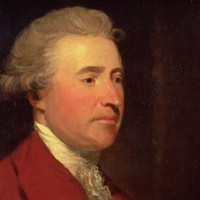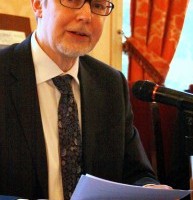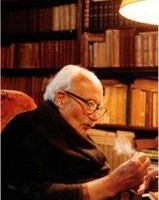Edmund Burke: the greatest Whig, the first conservative , by Daniel Hannan
I still remember the shock I felt when I was about half way through Burke’s Reflections on the Revolution in France. I was spending an undergraduate summer meandering slowly from Chicago to New Orleans when, in the middle of a passage about something else, I came across a glancing reference to France’s “captive king”. Stunned, I put the paperback down and stared round-eyed at my fellow Greyhound passengers.
Until that moment, it had not properly hit me that the entire book, the most penetrating denunciation of revolutionary excess ever composed, had been written before the Terror started. As a piece of political prophecy, it stands unsurpassed.
Burke predicted the chaos, the repression, the arbitrary confiscations , the executions and even, with uncanny foresight, the Bonapartist dénouement:
In the weakness of one kind of authority, and in the fluctuation of all, the officers of an army will remain for some time mutinous and full of faction, until some popular general, who understands the art of conciliating the soldiery, and who possesses the true spirit of command, shall draw the eyes of all men upon himself. Armies will obey him on his personal account. The moment in which that event shall happen, the person who commands the army is master of your whole republic.
There are never any prizes in politics for being right too early. Burke stood apart, an ascetic soothsayer, a lonely vate, descrying a future invisible to his contemporaries. He was right about America, right about Ireland, right about India and, outstandingly, right about France. As is usually the way, his peers never properly forgave him.
We may honour Burke as the first and greatest of those politicians who put ideas before preferment: the patron saint of all the Enoch Powells, so to speak. For three decades, Burke was the most gifted and eloquent MP in the Commons; yet he spent less than two years in government – resigning his junior ministerial post, typically, on a point of fairly minor principle.
We might venerate him, too, as one of the finest orators and pamphleteers of any age. If you think it odd that, as a teenager, I was reading Burke for pleasure on a Greyhound bus, I can only assume that you haven’t come across his prose. He is one of that tiny number of writers, along with Macaulay and Orwell, whose style pulls you along pretty well regardless of what they are talking about.
All this, though, is to miss the real significance of Burke. He was the first modern conservative thinker, and one of the most penetrating and complete political philosophers to have written in English. It is this aspect of the great Irishman that captivates Jesse Norman, his brilliant biographer – and incidentally, the Conservative MP for Hereford.
Read the complete article in The Telegraph
The Crisis of Fatherhood, by Stratford Caldecott
The Winter 2013 issue of Humanum, the freely available online journal of the Pope John Paul II Institute for Studies on Marriage and Family in Washington, DC (or rather the Institute’s Center for Pastoral and Cultural Research) is devoted to the crisis of fatherhood in our culture. It contains articles and book reviews devoted to the literature on this topic. (The following notes are based on the Editorial for the issue.)
The collapse of marriage in the developed world is happening faster than many believed possible. Civil marriages exceed religious ones, and both are in steep decline. In Italy, the heartland of Catholicism, where the largest religious institution on earth might be expected to have some influence, there are only 3.6 marriages a year for every thousand inhabitants, compared to 4.7 for the European Union as a whole—in the wealthy parts of Italy the numbers are even lower. Clearly most couples now do not get married. Single parents, especially single mothers, are commonplace. Given that it is hard enough for a stable, loving couple to bring up a child, or children, the difficulties faced by single parents are formidable.
The recovery of fatherhood is not merely a political and sociological challenge, to be met by strengthening the legislation that keeps families together, deters separation, and insists that a man takes more responsibility for his children (whether he be married or not). What needs to be recovered is a vision, a sense of responsibility, something the philosopher Gabriel Marcel in his book Homo Viator (1951) called a “creative vow”.
The father is more than a biological instrument above all when he is prepared to consecrate himself for a role that transcends the physical. He gives of himself biologically to the mother when the child is conceived; but he gives of himself spiritually when he accepts a continuing and indeed eternal responsibility for the gift that God gives him in return—the gift of the child whom he did not fashion and whose destiny he cannot determine or control.
No longer the primary breadwinner, today’s father is not even necessarily the one who engendered his own child, thanks to the wonders of IVF. Technology, which already in the 1960s severed the connection between sex and reproduction, now promises to separate gender from parenthood entirely. It is hardly surprising that so many fathers are missing from the landscape of the contemporary family.
In the current issue of Humanum Nicholas J. Healy concludes:
“It is tempting to cover the wounds that result from an absent father or from an abusive father by diminishing the significance of fatherhood. But this forgetfulness of origins leads to a greater loneliness and metaphysical confusion. A more promising path is to reflect more deeply on the hidden Fatherhood of God that undergirds and encompasses every human origin no matter how broken.”
Read the complete article in The Imaginative Conservative
International Society for Gómez Dávila’s Studies
Here you can find a link to the International Society for Gómez Dávila’s Studies, in his 100th anniversary: www.nicolasgomezdavila.com


